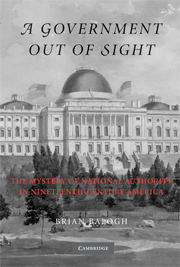Book contents
- Frontmatter
- Contents
- Acknowledgments
- 1 Introduction: Why Look Back?
- 2 How Americans Lost Sight of the State: Adapting Republican Virtue to Liberal Self-Interest
- 3 Between Revolutions: The Promise of the Developmental Vision
- 4 “To Strengthen and Perpetuate that Union”: Republican Political Economy
- 5 Outside the Boundaries: “Powers and Energies in the Extreme Parts”
- 6 The Uncontested State: Letters, Law, Localities
- 7 Restoring “Spontaneous Action and Self-Regulation”: Civil War and Civil Society
- 8 Judicial Exceptions to Gilded Age Laissez-Faire
- 9 “A Special Form of Associative Action”: New Liberalism and the National Integration of Public and Private
- 10 Conclusion: Sighting the Twentieth-Century State
- Index
5 - Outside the Boundaries: “Powers and Energies in the Extreme Parts”
Published online by Cambridge University Press: 05 August 2012
- Frontmatter
- Contents
- Acknowledgments
- 1 Introduction: Why Look Back?
- 2 How Americans Lost Sight of the State: Adapting Republican Virtue to Liberal Self-Interest
- 3 Between Revolutions: The Promise of the Developmental Vision
- 4 “To Strengthen and Perpetuate that Union”: Republican Political Economy
- 5 Outside the Boundaries: “Powers and Energies in the Extreme Parts”
- 6 The Uncontested State: Letters, Law, Localities
- 7 Restoring “Spontaneous Action and Self-Regulation”: Civil War and Civil Society
- 8 Judicial Exceptions to Gilded Age Laissez-Faire
- 9 “A Special Form of Associative Action”: New Liberalism and the National Integration of Public and Private
- 10 Conclusion: Sighting the Twentieth-Century State
- Index
Summary
In 1796 a Frenchman who had fought with Lafayette during the American Revolution paid a call on Secretary of War James McHenry. The visitor was surprised to find that there was no sentinel at the door. The building was virtually empty. Indeed, he could only encounter two clerks. The visitor was informed that the Secretary was at a neighbor's house getting a shave. This was surprising, as it was 11:00 in the morning. The observer was even more surprised to learn that the two clerks and one servant he met were the entire War Department, with the exception of the well-coiffed Secretary.
No wonder scholars have referred to central government in the early national period as a “midget institution in a giant land.” According to the standard accounts, the national government went from little to nothing after the Jeffersonian “revolution” of 1800. The small chance to create a large state rested on the vision of men like Alexander Hamilton and a few other Federalists. The hopes of these men were “smothered,” the story goes, by the Jeffersonian Republicans, who read conspiracy into any attempt to strengthen the General Government. Symbolic of this trajectory was the fate of the capital city itself. Washington, D.C. performed “visual therapy” for citizens concerned about consolidation. There were no grand buildings, courts, or imposing corridors. In fact, baffled citizens who asked where the capital could be found were often surprised to learn that they were standing in its center.
Measured by traditional standards such as staff size, the presidency was virtually invisible. As late as 1825, John Quincy Adams could count on only one staff member – his son, who had just been expelled from Harvard.
- Type
- Chapter
- Information
- A Government Out of SightThe Mystery of National Authority in Nineteenth-Century America, pp. 151 - 218Publisher: Cambridge University PressPrint publication year: 2009



